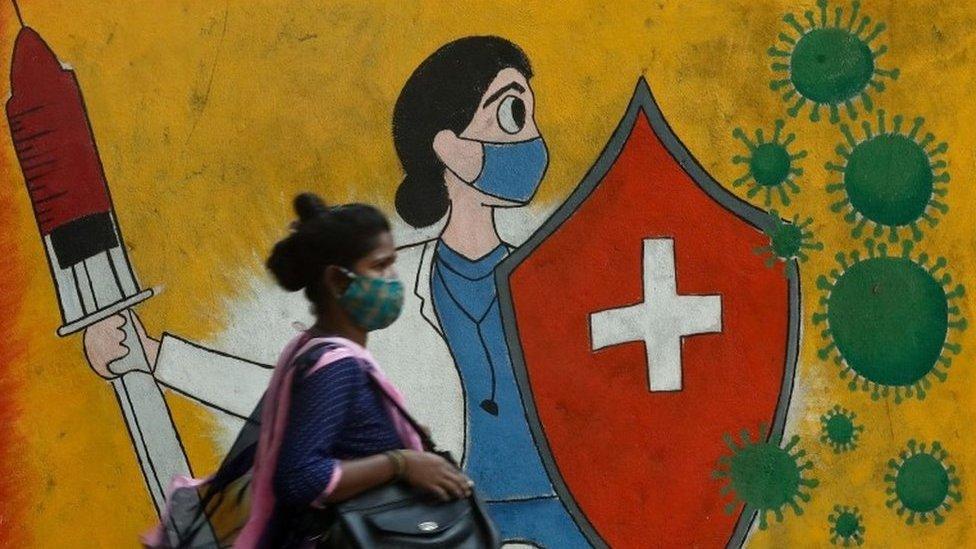The Delta pressure was mentioned to be accountable for the lethal second wave of infections
India has labeled a brand new variant of the coronavirus first recognized in Europe as a “variant of concern”, however it’s too early to tell whether or not it poses a major risk.
India’s well being ministry says research confirmed that the so-called Delta plus variant – also referred to as AY.1 – spreads extra simply, binds extra simply to lung cells and is doubtlessly resistant to monoclonal antibody remedy, a potent intravenous infusion of antibodies to neutralise the virus.
The variant is said to the Delta, an current variant of concern, which was first recognized in India final 12 months and is assumed to have pushed the lethal second wave of infections this summer time in India.
The well being ministry says the Delta plus variant, first present in India in April, has been detected in round 40 samples from six districts in three states – Maharashtra, Kerala and Madhya Pradesh. At least 16 of these samples have been present in Maharashtra, one of the states hardest hit by the pandemic.
Delta plus has additionally been present in 9 different nations – USA, UK, Portugal, Switzerland, Japan, Poland, Nepal, Russia and China – in contrast to the unique extremely contagious Delta pressure, which has now unfold to 80 nations.
Graphic reveals present names for covid variants and WHO’s proposed Greek names
Viruses mutate on a regular basis and most adjustments are inconsequential. Some even hurt the virus. But others could make the illness extra infectious or threatening – and these mutations have a tendency to dominate.
A mutation is elevated from a “variant of interest” to a “variant of concern” (VOC) when it reveals proof of fulfilling a minimum of one of a number of standards, together with straightforward transmission, extra extreme sickness, diminished neutralisation by antibodies or diminished effectiveness of therapy and vaccines.
But main virologists have questioned the labelling of Delta plus as a variant of concern, saying there was no information but to show that the variant was extra infectious or led to extra extreme illness in contrast to different variants.
“There is no data yet to support the variant of concern claim,” mentioned Dr Gagandeep Kang, a virologist and the primary Indian lady to be elected Fellow of the Royal Society of London.
Story continues
“You need biological and clinical information in order to consider whether it is truly a variant of concern.”
This means India wants extra information to decide whether or not the variant is neutralised by antibodies generated by obtainable vaccines or an infection by one other variant of the coronavirus.
Also, intensive information is required concerning the enhance in transmissibility, diagnostic failures – routine assessments not choosing up the variant – and whether or not the variant is inflicting extra extreme illness.
Hundreds of hundreds of viral genomes have been analysed the world over
“You need to study a few hundred patients who are sick with this condition and variant and find out whether they are at greater risk of greater disease than the ancestral variant,” Dr Kang mentioned.
The Delta plus variant accommodates a further mutation known as K417N on the coronavirus spike, which has been discovered within the Beta and Gamma variants, first present in South Africa and Brazil respectively (Beta was linked to elevated hospitalisation and deaths throughout South Africa’s first wave of infections, whereas Gamma was estimated to be extremely transmissible).
Even with 166 examples of Delta plus shared on GISAID, a worldwide open sharing database, “we don’t have much reason to believe this is any more dangerous than the original Delta,” in accordance to Dr Jeremy Kamil, a virologist at Louisiana State University Health Sciences Center in Shreveport.
“Delta plus might have a slight advantage at infecting and spreading between people who were previously infected earlier during the pandemic or who have weak or incomplete vaccine immunity,” Dr Kamil advised me.
“I would keep calm. I don’t think India or anyone else in the world has released or accumulated enough data to distinguish the risk from the so-called Delta plus as being more dangerous or concerning than the original Delta variant.”
Dr Anurag Agarwal, director of the Delhi-based CSIR-Institute of Genomics and Integrative Biology (IGIB), one of the 28 Indian labs concerned in genome sequencing, mentioned “all lineages of the Delta variant are variants of concern”, so there was nothing uncommon in labelling Delta plus as such.
“We do not have any indicators as of now to show that Delta plus should be causing any public health worry or panic. We are not seeing anything worrisome yet. We are tracking it carefully, and strengthening all public health measures,” he mentioned.
Dr Kamil mentioned the federal government in India “would rather over-react now than seem flat-footed later, as was the case with the Delta variant”.
Most scientists say India dropped the ball on sequencing sufficient samples for the variant which had fuelled an enormous second surge in Covid infections in India in April and May.
“I am not overly worried. But it’s fair to keep an eye on the variant.”
Read extra tales by Soutik Biswas
Source link








